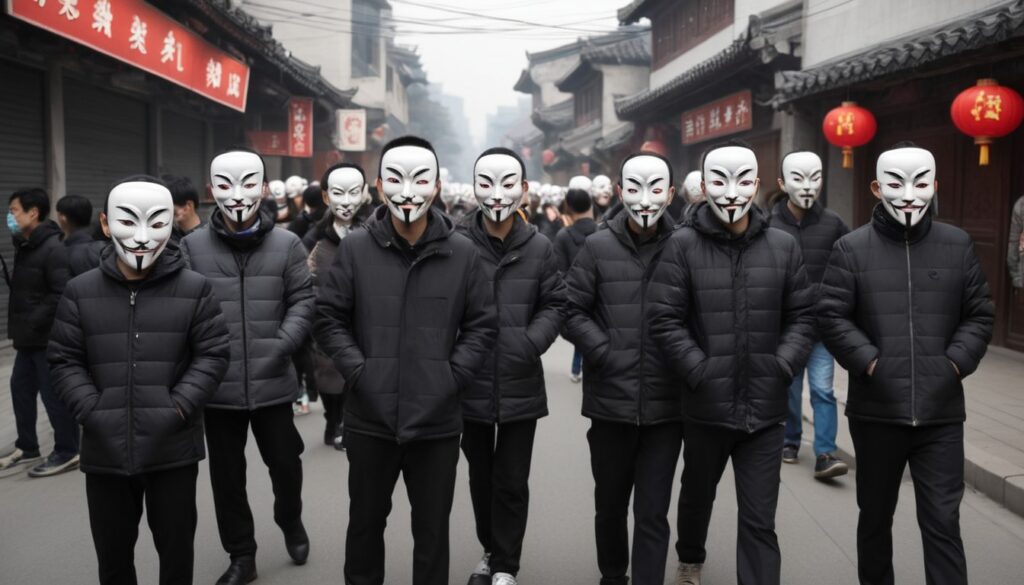Anonymous is an international collective of hacktivists known for its various cyber operations against governments, organizations, and corporations. The group, having no centralized structure, operates based on a shared ideology. Its members wear the Guy Fawkes mask as a symbol of resistance and anonymity. This article delves into how Anonymous works, examining its organizational structure, methods of operation, and impact on society and politics.

Origins and Ideology
Anonymous originated in 2003 on the imageboard 4chan, initially as a concept of many online and offline community users simultaneously existing as an anarchic, digitized global brain. Initially, the group focused on pranks and minor hacks. However, over time, it evolved into a more politically driven entity, aiming to address issues of freedom of speech, human rights, and information ethics. The collective’s ideology is decentralized and leaderless, embodying the principle that anyone can take action under the Anonymous banner, provided they align with the group’s overarching principles.
Organizational Structure
Anonymous’s structure is unique and unconventional. It has no leaders, no hierarchical organization, and no clear membership criteria, except for the shared ideology and objectives among its participants. This fluid and decentralized nature allows the group to operate flexibly and adaptively, making it difficult for authorities to infiltrate or dismantle it. Members communicate through various encrypted internet platforms, including forums, chat rooms, and social media, to plan and coordinate their activities.
Methods of Operation
Anonymous employs a wide range of tactics in its operations. These can include legal and illegal activities, ranging from peaceful protests to hacking and data breaches. The collective’s actions are often reactionary, targeting institutions or organizations that they believe are corrupt, unjust, or infringing on freedom and privacy. Some of the methods used by Anonymous include:
- DDoS Attacks: One of the most common tactics is the Distributed Denial of Service (DDoS) attack, where numerous compromised computers flood a website’s servers with traffic to take it offline.
- Hacking and Data Breaches: Anonymous has been known to hack into systems to steal and leak information, especially to expose wrongdoing.
- Public Awareness Campaigns: The group utilizes social media and digital platforms to spread awareness about various issues, rallying public support and action.
- Offline Protests: While much of Anonymous’s activities are online, they also organize and participate in physical protests and demonstrations.
Impact on Society and Politics
Anonymous has had a significant impact on society and politics, drawing attention to issues like internet freedom, privacy, and corruption. The group’s actions have led to public debates about the balance between security and freedom, the ethics of hacking, and the role of individuals in challenging powerful institutions. While some view Anonymous as vigilantes or cyber terrorists, others see them as digital Robin Hoods fighting for the common good.
Ethical and Legal Considerations
The activities of Anonymous raise complex ethical and legal questions. While the group has exposed wrongdoing and advocated for positive changes, its methods, particularly hacking and DDoS attacks, are illegal and raise concerns about privacy, security, and the rule of law. The anonymity and lack of accountability within the group also pose challenges, as individuals can act in its name without consensus or consideration of the broader consequences.
Future of Anonymous
The future of Anonymous is uncertain. As technology evolves, so too will the tactics of hacktivism and cyber resistance. The decentralized and leaderless nature of Anonymous means it is resilient but also unpredictable. Its legacy, however, highlights a significant shift in how individuals and collectives can influence global politics and society in the digital age.
Conclusion
Anonymous represents a modern form of protest and dissent, leveraging the power of the internet to challenge and expose. Its operations, characterized by a blend of activism, hacktivism, and public engagement, reflect the complex nature of digital society. While controversial, Anonymous has undeniably contributed to important conversations about democracy, transparency, and freedom in the digital era. As we move forward, the actions and impact of Anonymous—and groups like it—will continue to shape the evolving relationship between technology, politics, and individual rights.